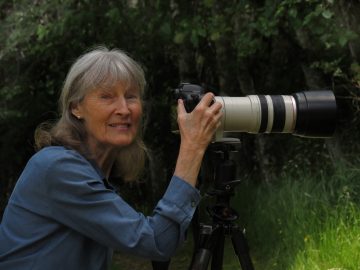Biography
Birgit Freybe Bateman BEd’70 is a retired secondary school art teacher, artist, award-winning photographer, environmentalist, outdoor enthusiast, birdwatcher and lecturer. As a child she emigrated from Germany to Canada with her family in 1955 and began studying at UBC in 1965. Since she was a little girl, she has always done art. The teaching profession allowed her to team up with Robert Bateman in Ontario. Since both had the same interests of art and nature, they married. She was able to help him in every aspect of his career especially once they both retired from teaching early to do art full time. Eventually they moved to Salt Spring Island where both have their studios and their large family can all meet up. This is a huge and important part of her life. They have had classes of students to their studio and have been able to continue their teaching methods there. She is also helping The Bateman Gallery of Nature in Victoria by advising on funding, programs and especially with the Nature Sketch program. She feels that she has been very lucky to travel around the world photographing nature and other cultures. The Peninsula Gallery in Sidney represents her photographs.
Meeting Birgit
What is your most memorable experience from your time in the Faculty of Education?
In the 1960’s women were realizing that one could have jobs other than nurse, secretary or teacher. I wanted to be something more sophisticated like an artist or museum curator. After the first year of general arts, I was told that the Faculty of Education was an ideal way to experience the various methods of doing art by real artists creating original work. Since the professors in the Faculty of Education (Sec.) were artists themselves, they were excellent at demonstrating techniques, but could also communicate well. They were very approachable and willingly helped with any problems I might have had. I do remember always being happy and inspired in the Faculty of Education classes. In my first practicum, I realized that I should have recognized earlier that I would love teaching. When I was a public school student, I had always enjoyed school and spent as much time as possible there.
Where has your education from the Faculty of Education taken you in your career?
Having such teachers as the late artists Sam Black, Gordon Smith, Penny Gouldstone and Jim MacDonald in the Secondary Education Faculty inspired me immensely. They taught methods to help all students create meaningful pieces of art, not just the most gifted. I’m convinced that it was their teaching methods that earned me the position of high school art teacher in 1971 at a new school in Burlington, ON called Lord Elgin High School in which the other teacher was Robert Bateman. He was very impressed with my programs and organizational skills. Together we developed a strong art department. After we both retired to concentrate on our art and travel, we kept our hands in education by giving workshops and lectures.
Where do issues of inclusion find a place in your life or at work?
Coming from Germany 10 years after the war, when it was still fresh in people’s minds, was not easy for me. I was called all kinds of bad names and made fun of. In those days they didn’t have English as a Second Language Classes. Since I could not speak English, I was put back into Grade 1, even though I should have been in Grade 3. My first teacher in Grade 1, made me stand up in front of the whole class and try to say “th” a hundred times, obviously very humiliating for a new child. I vowed to never demean anyone in any way, but especially, if they were different. That principle really directed me in how I lived my life and in my teaching. One of my students had Cerebral Palsy and could not control whatever implements he was using, but with my encouragement still managed to make the most impressive pieces of art of which he was really proud.
Do you have any words of wisdom for current students? Newly graduated folks?
I feel that teaching is one of the most satisfying professions and will always be needed in a civilized world. Not only that, it prepares you for speaking in front of groups, which will come in handy the rest of your life. If you do what you love in life, you’ll always be satisfied.
